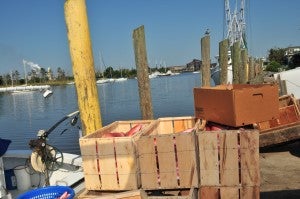Beginning on September 8, 2012, a series of closures will begin for commercial fishermen in the South Atlantic. Closures have become all too commonplace for fishermen in the region that spans from North Carolina all the way down the Atlantic coast of Florida.
The upcoming closures will include a number of species:
Complex | Species | Closure Begins |
Deepwater | Yellowedge grouper, blueline tilefish, silk snapper, misty grouper, queen snapper, sand tilefish, black snapper, blackfin snapper | September 8, 2012 |
Gray triggerfish | Gray triggerfish | September 11, 2012 |
Porgy | Jolthead, knobbed, saucereye, whitebone, scup | September 8, 2012 |
Yellowtail snapper | Yellowtail snapper | September 11, 2012 |
Command and control management that dominates the South Atlantic fisheries isn’t working for fish or for fishermen. Stocks are continuing to suffer and fishermen are barely hanging on. We continue to hear reports from fishermen that many are ready to leave the fishing business, some have had to look to government assistance to feed their families and many face a serious mountain of debt. Being off the water for months at a time and working in constant fear of closures is no way to run a business.These species are crucial to many commercial fishermen in the region. The closure of the gray triggerfish and yellowtail snapper fisheries are unprecedented. With spawning closures taking place at the beginning of 2013, this could mean more than six months off the water for many commercial snapper-grouper fishermen.
South Atlantic fishermen work on a portfolio of species. As frequent closures have become a part of fishing in the southeast, many have been able to move from species to species. With new species being added to the list regularly, this will become harder and harder to do.

Fish being packed at a dock in South Carolina.
The South Atlantic Fishery Management Council is working hard to battle overfishing, but have limited themselves to the outdated management that leads to closures and regulatory limits on who can fish for species, how they do it and when they are allowed.
In July, the commercial black sea bass season opened with almost half of the fishermen eliminated by a new program called “endorsements.” Endorsements are a fishery management tool that eliminates fishermen from a specific fishery to handle overfishing by setting a minimum average of pounds of fish that fishermen must have caught in the past to receive an “endorsement” to fish for that species in the 2012 season.
There are better ways to ensure the survival of fish populations and fishermen. As I wrote with Jack Cox, a commercial fishermen from Morehead City, NC, last month – “No matter what you believe is the best way to manage a fishery, the current system isn’t working. We cannot continue to manage by cutting fishermen’s throats. For too long, the debate about new choices for management has been dominated by vitriol and fear-mongering. We owe it to the many hard-working South Atlantic fishermen to find better solutions that keep fishermen on the water, feed their families and sustain fishing communities.”
These closures are going to be bad news for fishermen in the region and the future of rebuilding these species in the region is unclear. We’ve seen what management tools like catch shares can do for other regions and we’re ready to work with fishermen like Jack and others to find a way forward in the South Atlantic.









